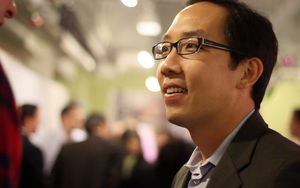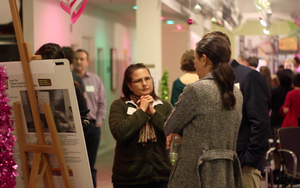Future Now
The IFTF Blog
CivicMeet Palo Alto: How can civic life innovate in the heart of Silicon Valley?
When you put the Mayor of Palo Alto, futures thinking methodologies, and engaged citizens together, the outcome is far from your average local community meeting. Rather than hemming and hawing in a dimly lit government basement, the City of Palo Alto held its first ever CivicMeet at the Institute for the Future on December 13, 2013. Upwards of 70 participants joined city staff, IFTF researchers, and interested citizens to think more strategically about the challenges of innovating civic life in the local community.
 Palo Alto holds the greatest confluence of intelligence, wealth, and the willingness to make things happen since the Golden Era of Florence, said Mayor Yiaway Yeh (@YiawayYeh) to the eager group gathered. But every city faces difficulty in striving for ambitious change while still answering the daily challenges of city management. Joined by Chief Information Officer Jonathan Reichental (@PaloAltoCIO) and City Manager James Keene, the mayor asked the group to think bigger and bolder about the future of Palo Alto and Silicon Valley.
Palo Alto holds the greatest confluence of intelligence, wealth, and the willingness to make things happen since the Golden Era of Florence, said Mayor Yiaway Yeh (@YiawayYeh) to the eager group gathered. But every city faces difficulty in striving for ambitious change while still answering the daily challenges of city management. Joined by Chief Information Officer Jonathan Reichental (@PaloAltoCIO) and City Manager James Keene, the mayor asked the group to think bigger and bolder about the future of Palo Alto and Silicon Valley.
Grabbing easels and flipcharts, participants divided themselves around several key issue areas facing Palo Alto to think creatively about how to grow the possibilities the city can consider. IFTF staff Marina Gorbis, Sean Ness, Jake Dunagan, Jean Hagan, and Bettina Warburg facilitated the groups on topics ranging from using data for city innovation to keeping nonprofits in Palo Alto to improving the local options for arts, culture, and lifestyle. One group focused on imagining local and social gift economies came up with several options for mapping “invisible assets” around town that could be bartered between local organizations and residents. The use of IFTF’s space by the city was an example of possible, in-kind partnerships that could be extended. On affordable housing and the arts, participants came up with diverse uses of parking lots to create edgy yet inexpensive artist quarters and gallery spaces. And the group on data use listed a hefty set of proposals for the city to consider. Many of these ideas are actionable in the present, and there was palpable excitement from participants and officials alike.
 While CIO Reichental considered the event a success just for the number of engaged citizens and rich meeting experience, the larger plan for civic engagement by the city is already underway. Stay tuned for CityCamp, which will take place in coordination with IFTF’s ReConstitutional Convention at the end of April. Mayor Yeh also announced the formation of the Civic Innovation Council, which will meet to propose plausible and meaningful innovations that can be brought to funders.
While CIO Reichental considered the event a success just for the number of engaged citizens and rich meeting experience, the larger plan for civic engagement by the city is already underway. Stay tuned for CityCamp, which will take place in coordination with IFTF’s ReConstitutional Convention at the end of April. Mayor Yeh also announced the formation of the Civic Innovation Council, which will meet to propose plausible and meaningful innovations that can be brought to funders.
The modern city square can be bigger, bolder, and louder, and the IFTF believes there is an urgent need to reimagine both governance and the role of civic life. You can bring your own ideas to the conversation by tweeting using #civicmeetpa.
 IFTF's Governance Futures Lab brings social inventors and futures thinking to the challenge of designing better systems of governance. Through a range of public activities and initiatives, our goal is to facilitate the definition and invention of new governance systems appropriate for an age of planetary challenges and human responsibility.
IFTF's Governance Futures Lab brings social inventors and futures thinking to the challenge of designing better systems of governance. Through a range of public activities and initiatives, our goal is to facilitate the definition and invention of new governance systems appropriate for an age of planetary challenges and human responsibility.
Want to find out more?
- Learn more about the Governance Futures Lab
- Follow the conversation @iftf
- Contact Sean Ness (sness@iftf.org or 650-233-9517)



